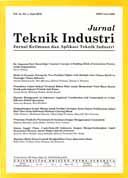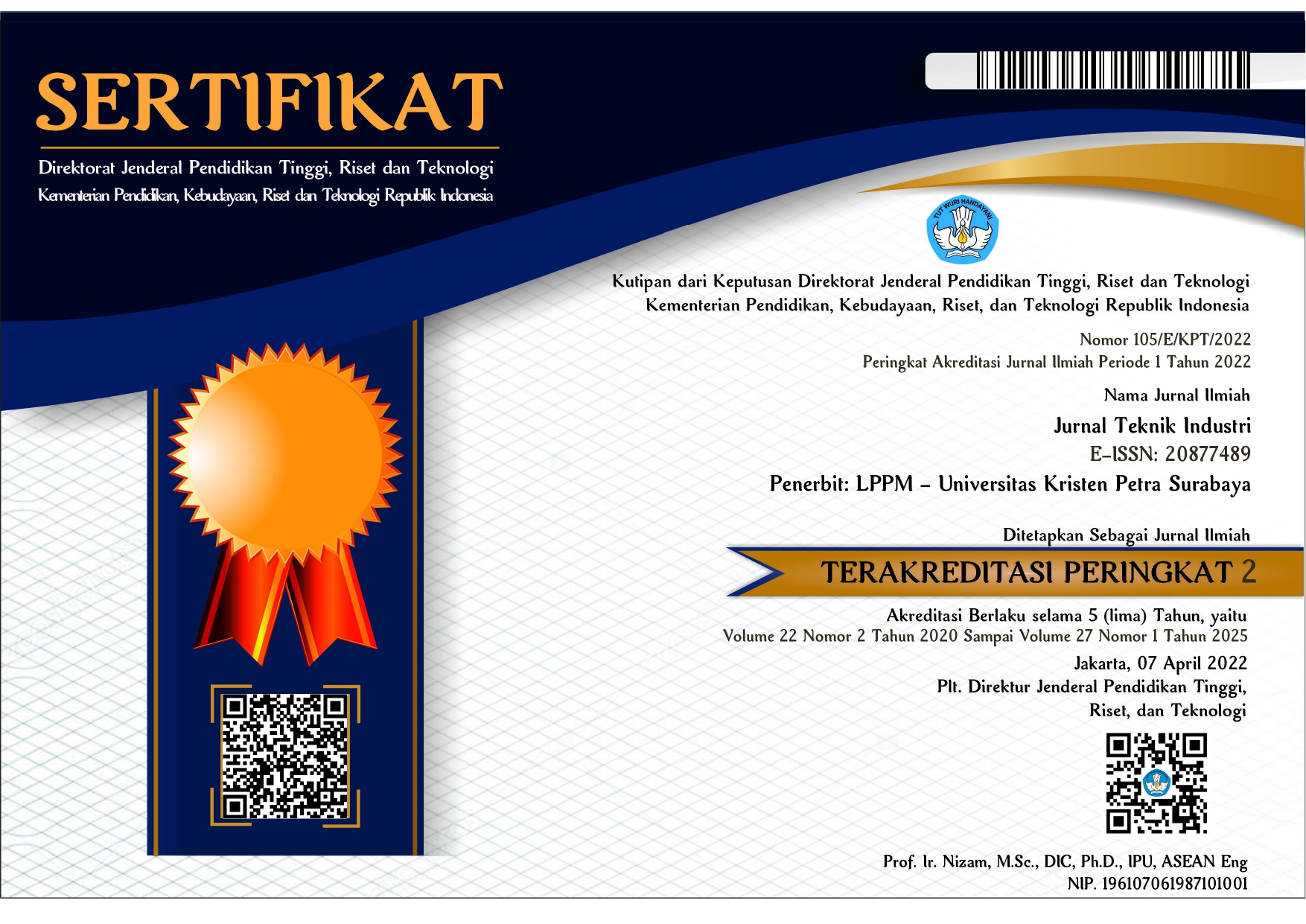Capability Factor Identification and Influence Assesment on Supply Chain Resilience in Indonesian Automotive Industry
DOI:
https://doi.org/10.9744/jti.24.1.73-82Keywords:
Automotive, Capabilities, Resilience, DEMATEL, InfluenceAbstract
The Automotive Industry is one of the business lines affected by the COVID-19 pandemic in Indonesia. The pandemic causes instability in the Indonesian economy from demand and sales. The supply chain is a long process consisting of parties involved directly or indirectly in fulfilling customer needs: suppliers, manufacturers, shipping, warehouses, checking, and the customers themselves. In an increasingly dynamic and volatile global environment, various events threaten to disrupt supply chain operational activities. For example, the COVID-19 pandemic has caused supply chain management to be very vulnerable due to closing access and lockdown policy. Therefore, the designed supply chain system must withstand disruptions and recover quickly at a minimal cost. Supply Chain Resilience (SCR) is the ability of the supply chain to survive, adapt, and overcome operational disruptions that can damage the supply chain system so that the supply chain can quickly recover from disruptions and reconstruct the supply chain to be stronger than before. SCR has attributes that enable companies to anticipate and overcome disruptions. The Automotive Industry in Indonesia needs to identify what capabilities have been or will be used to anticipate supply chain disruptions which are then quantified to find out which capabilities have the most effect on increasing supply chain resilience. The method used in this study is DEMATEL (Decision Making Trial And Evaluation Laboratory) - ANP (Analytic Network Process) based, which can visualize causal relationships between factors through a cause-and-effect diagram and show the extent to which these factors influence each other.
Downloads
References
Kementerian Perindustrian RI, Analisis Perkembangan Industri Pengolahan Non Migas Indonesia 2020-Edisi IV, www.kemenperin.go.id, p. 08, 2020, Available: https://www.kemenperin.go.id/download/25489/Laporan-Analisis-Perkembangan-Industri-Edisi-IV-2020
Chopra, S., and Meindl, P., Supply Chain Management: Global Edition. 2016.
Ivanov, D., Structural Dynamics and Resilience, Supply Chain Risk Management, 265, November 2017,2018.
Brusset, X., and Teller, C., Supply Chain Capabilities, Risks, and Resilience, International Journal of Production Economic, 184, June 2016, 2017, pp. 59–68.
Croxton, K., Fiksel, J., Knemeyer, M., and Polyviou, M., The Resilient Supply Chain, no. January, 2019.
Liu, X., Dou, Z., and Yang, W., Research on Influencing Factors of Cross Border E-Commerce Supply Chain Resilience based on Integrated Fuzzy DEMATEL-ISM, IEEE Access, 9, 2021, pp. 36140–36153.
Zhang, Z., Srivastava, P. R., Eachempati, P., and Yu, Y., An Intelligent Framework for Analyzing Supply Chain Resilience of Firms in China: A Hybrid Multicriteria Approach, International Journal of Logistic Management, 2021, doi: 10.1108/IJLM-11-2020-0452.
Aggarwal, S., and Srivastava, M., K., A Grey-Based DEMATEL Model for Building Collaborative Resilience in Supply Chain, International Journal of Qualitative Reliability Management, 36(8), 2019, pp. 1409–1437. doi: 10.1108/IJQRM-03-2018-0059.
Ramesh, K.T., Sarmah, S. P., and Tarei, P. K., An Integrated Framework for the Assessment of Inbound Supply Risk and Prioritization of the Risk Drivers: A Real-life Case on Electronics Supply Chain, Benchmarking, 27(3), 2020, pp. 1261–1286. doi: 10.1108/BIJ-03-2019-0119.
Ramezankhani, M, J., Torabi, S, A., and Vahidi, F., Supply Chain Performance Measurement and Evaluation: A Mixed Sustainability and Resilience Approach, Computer and Industrial Engineering, 126, June, 2018, pp. 531–548. doi: 10.1016/j.cie.2018.09.054.
Rajesh, R., and Ravi, V., Analyzing Drivers of Risks in Electronic Supply Chains: A Grey–DEMATEL Approach, International Journal of Advanced Manufacturing Technology, 92(1-4), 2017, pp. 1127–1145. doi: 10.1007/s00170-017-0118-3.
Samvedi, A., and Jain, V., A Study on the Interactions between Supply Chain Risk Management Criteria using Fuzzy DEMATEL Method, International Journal of Operational Research, 18(3), 2013, pp. 255–271. doi: 10.1504/IJOR.2013.056685.
Tarei, P, K., Thakkar, J, J., and Nag, B., A Hybrid Approach for Quantifying Supply Chain Risk and Prioritizing the Risk Drivers: A Case of Indian Petroleum Supply Chain, Journal of Manufacturing Technology Management, 29(3), 2018, pp. 533–569. doi: 10.1108/JMTM-10-2017-0218.
Shao, L., and Jin, S., Resilience Assessment of the Lithium Supply Chain in China under Impact of New Energy Vehicles and Supply Interruption, Journal of Cleaner Production, 252, 2020, doi: 10.1016/j.jclepro.2019.119624.
Fu, X., Zhu, Q., and Sarkis, J., Evaluating Green Supplier Development Programs at a Telecommunications Systems Provider, International Journal of Production Economics, 140(1), 2012, pp. 357–367. doi: 10.1016/j.ijpe.2011.08.030.
Shao, J., Taisch, M., and Ortega-Mier, M., A Grey-DEcision-MAking Trial and Evaluation Laboratory (DEMATEL) Analysis on the Barriers between Environmentally Friendly Products and Consumers: Practitioners’ Viewpoints on the European Automobile Industry, Journal of Cleaner Production, 112, 2016, pp. 3185–3194. doi: 10.1016/j.jclepro.2015.10.113.
Hosseini, S., Ivanov, D., and Dolgui, A., Review of Quantitative Methods for Supply Chain Resilience Analysis, Transportation Researach Part E Logistic and Transportation Review, 125, February, 2019, pp. 285–307. doi: 10.1016/j.tre.2019.03.001.
Liu, C., L., Shang, K, C., Lirn, T, C., Lai, K., H., and Lun, Y, H, V., Supply Chain Resilience, Firm Performance, and Management Policies in the Liner Shipping Industry, Transportation Research Part A Policy and Practice, 110, 2018, pp. 202–219. doi: 10.1016/j.tra.2017.02.004.
Jindal, A., Sharma, S, K., Sangwan, K., S., and Gupta, G., Modelling Supply Chain Agility Antecedents using Fuzzy DEMATEL, Procedia CIRP, 98, 2021, pp. 436–441. doi: 10.1016/j.procir.2021.01.130.
El Baz, J., and Ruel, S., Can Supply Chain Risk Management Practices Mitigate the Disruption Impacts on Supply Chains’ Resilience and Robustness? Evidence from an Empirical Survey in a COVID-19 Outbreak Era, International Journal of Production Economics, 233, October 2020, 2021. doi: 10.1016/j.ijpe.2020.107972.
Karmaker, C, L., and Ahmed, T., Modeling Performance Indicators of Resilient Pharmaceutical Supply Chain, Moderm Supply Chain Research and Applications, 2(3), 2020, pp. 179–205. doi: 10.1108/MSCRA-04-2020-0006.
Mubarik, ., S., and Kazmi, S, H, A., Resilience and Cleaner Production in Industry 4.0: Role of Supply Chain Mapping and Visibility, Journal of Cleaner Production, 292, 2021, p. 126058. doi: 10.1016/j.jclepro.2021.126058.
Mishra, D, K., Ghadi, M, J., Azizivahed, A., Li, L., and Zhang, J., A Review on Resilience Studies in Active Distribution Systems, Renewable and Sustainable Energy Review, 135, March 2020, 2021, doi: 10.1016/j.rser.2020.110201.
Mancheri, N, A., and Tukker, A., Resilience in the Tantalum Supply Chain, Resources Conservation and Recycling, 129, February 2017, 2018, pp. 56–69. doi: 10.1016/j.resconrec.2017.10.018.
Wong, C, W, Y., Lirn, T, C., Yang, C, C., and Shang, K, C., Supply Chain and External Conditions under which Supply Chain Resilience Pays: An Organizational Information Processing Theorization, International Journal of Production Economics, 226, June 2018, 2020, p. 107610. doi: 10.1016/j.ijpe.2019.107610.
Shao, L., and Jin, S., Resilience Assessment of the Lithium Supply Chain in China under Impact of New Energy Vehicles and Supply Interruption, Journal of Cleaner Production, 252, 2020, p. 119624. doi: 10.1016/j.jclepro.2019.119624.
Downloads
Published
How to Cite
Issue
Section
License
Articles published in the Jurnal Teknik Industri: Jurnal Keilmuan dan Aplikasi Teknik Industri will be Open-Access articles distributed under the terms and conditions of the Creative Commons Attribution License (CC BY).
![]()
This work is licensed under a Creative Commons Attribution License (CC BY).



















